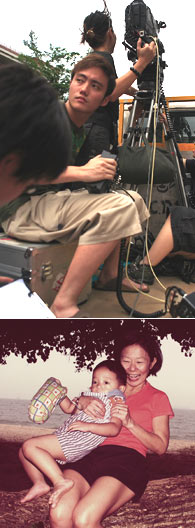Great art by one artist commonly inspires other artists. Three years ago, when young Singapore filmmaker Boo Junfeng watched the stage production of Alfian Sa'at's groundbreaking gay play Landmarks: Asian Boys Vol. 2, he was completely moved by a segment of the play which depicted the fragile relationship between a mother and her gay son.

Top image: Boo Junfeng; bottom: scene from Katong Fugue
Boo is now hard at work at developing another one of the play's segments into a feature-length film script. Should the film get made, it will no doubt be something of a watershed for Singapore's LGBT community.
He may be only 23, but he has already been called "the next Royston Tan" by fans of Singapore cinema. When he submitted two short films to the Singapore International Film Festival two years ago, one of them (A Family Portrait) won the Best Film award as well as the Best Achievement Award. It is a double victory that has been accomplished by only one other filmmaker - Royston Tan, of course.
Thus far, Boo's films have been praised for their sharp and precise observations of human behavior. Every scene has its purpose and its weight, every image feels carefully thought out. No frame is wasted. They call to mind the works of esteemed Taiwanese directors such as Hou Hsiao-hsien (Three Times), Edward Yang (Yi Yi) and Lee Ang (Brokeback Mountain) - all of whom he counts as inspiration.
Poised and poignant, Katong Fugue tells the story of a closeted gay boy (Luke Kwek) and his mother (Neo Swee Lin) who is struggling to bridge the silence between them. Though she knows that he is gay and wants to reach out to him, he is not ready to come out to her. So he keeps to himself in his room, tinkering on his piano. But sometimes when he goes out, she would sneak into his room and gaze at his belongings - desperately searching for clues that would help her understand his secret life.
Putting the play on celluloid, Boo has managed to translate its wordy text into powerful cinematic visuals, expanding the narrative to show us events that the play only implied. He has cleverly structured the film using a dichotomy of absence and presence: The son is largely absent in the film, but his presence is felt in every frame. This notion of absence/presence becomes the film's central tension.
Fridae caught up with the boyishly-handsome director to talk about the film:
æ: There were eight segments that made up Alfian's Asian Boys Vol 2. Why did you choose to adapt Katong Fugue in particular?
Junfeng: I loved the story between the mother and her gay son. It echoed certain aspects of my own relationship with my mother. I think that most gay, lesbian and transgendered people go through a very difficult phase of their lives where they have to decide if they want to come out to their parents, or if they want to lead a double life. So this film will hopefully resonate with LGBT audiences here and abroad.
æ: You're also writing a feature-length script based on another segment of Asian Boys Vol 2�
Junfeng: That's right. I'm trying to turn The Widow of Fort Road segment into a feature-length script. This one is based on a real incident that happened in Singapore in 1993: Twelve men were arrested by the police for cruising in Tanjung Rhu (a stretch of beach famous for gay cruising). They had their names and occupations published in the biggest newspapers in the country. Now imagine what that must have done to those men! This film tries to do exactly that.
æ: I hope it gets produced because I can't wait to see it! Now you have not one, not two, but three short films playing at the Singapore International Film Festival. You must be so proud!
Junfeng: Katong Fugue is competing in the short film category. A Family Portrait, which was a double winner at the 2005 festival, is showing in a retrospective of award-winning shorts. And Changi Murals, a WWII drama about British prisoners-of-war, is being screened together with Aki Ra's Boys in the main programme. I feel so blessed. (Screening times for all three films can be found at the end of this article.)
æ: No wonder some people are calling you the "next Royston Tan."
Junfeng: I actually find that very scary and pressurising. I only hope that I can live up to some of those expectations.
æ: Last year you helped organised Short Circuit at the Substation, a groundbreaking film festival that featured the works of 10 Singapore gay and lesbian filmmakers together for the first time. How was that?
Junfeng: The response for that was fantastic! We didn't have any proper publicity for it; we just tried to tell people we knew via e-mail and word-of-mouth. But the gay and lesbian community came out in droves to support the works by their LGBT filmmakers.
We hope to organise a second festival sometime this year. Even Royston has agreed to come on board and help us organise it. How cool is that?
æ: Will gay cinema ever find a voice here in Singapore?
Junfeng: Definitely. As it is, our LGBT community has eagerly supported the gay films showing at the Singapore International Film Festival every year. In fact, those films are always the first to sell out! When you go to see them, you almost think you're walking into a Gay and Lesbian Film Festival, not a Singapore Film Festival.
That said, gay and lesbian filmmakers still have to be careful about the strict censorship laws here. Also, the only Singapore director who has made profits at the box-office is Jack Neo. Almost every other film has lost money - even those which garner great reviews. So it's hard not to think that a gay film might suffer the same fate at the box-office, even with ardent support from the LGBT community.
Screening time for Boo Junfeng's three short films:
1) Katong Fugue (2007) is a gay short film adapted from Alfian Sa'at's play. It will be screened for free at the Substation on Armenian St. this Saturday (14 April) between 8pm and 10pm, and on Monday (30 April) between 8pm and 10pm, along with other finalists in the short film competition.
2) A Family Portrait (2004) is an award-winning short film about a family secret that haunts a young man. It will be screened as part of the retrospective of award-winning Singapore shorts on 21 April at the National Museum at 7pm. Tickets available at Sistic and at the door.
3) Changi Murals, a WWII drama about British prisoners-of-war, is being screened together with Aki Ra's Boys on 24 April at the National Museum at 9.15pm. Tickets available at Sistic and at the door.

